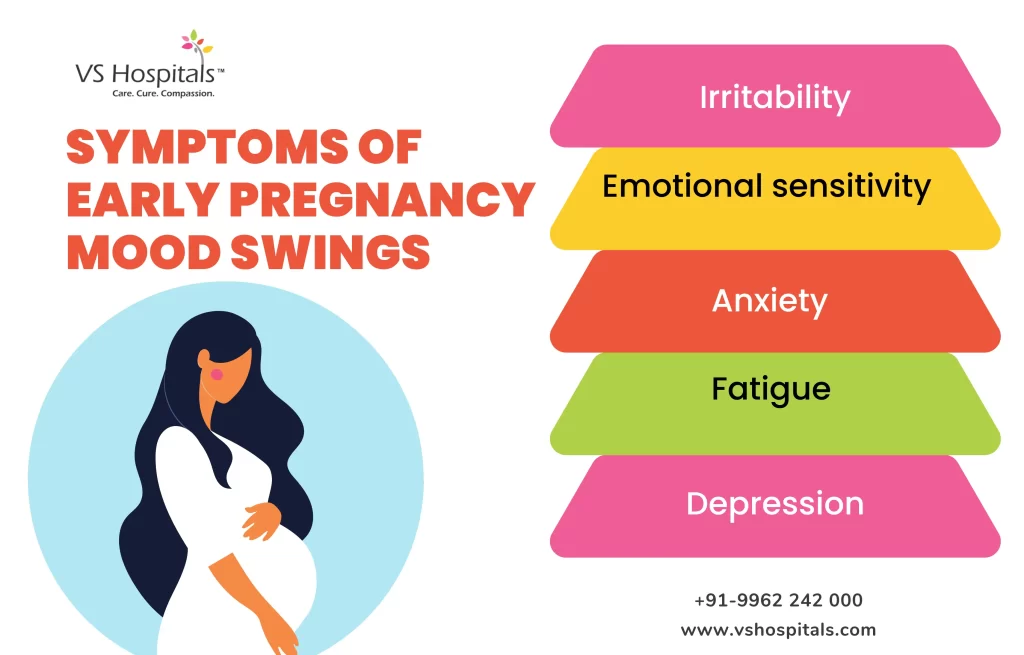Pregnancy mood swings are a normal part of pregnancy and are experienced by many women. However, if early pregnancy mood swings, early pregnancy and mood swings, become severe or if a woman experiences symptoms of depression or anxiety, it’s important to seek support from a healthcare provider.
Overview
Pregnancy mood swings, mood swings early pregnancy, refer to the changes in a pregnant woman’s mood that are commonly experienced during pregnancy. These mood swings can include a wide range of emotional changes, from feeling elated and happy to feeling sad, anxious, irritable, or overwhelmed.
The hormonal changes that occur some conditions like back pain, stress, during pregnancy can contribute to these mood swings, as can the physical and emotional changes that come with pregnancy. Additionally, the stress and anticipation of becoming a parent can also contribute to early pregnancy mood swings.

Symptoms of Early Pregnancy Mood Swings
It’s normal to experience early pregnancy mood swings, early pregnancy and mood swings, but if your mood swings are severe or if you’re finding it difficult to manage them on your own, you may want to consider seeking professional help. Here are some signs that it may be time to talk to a healthcare provider:
- Your mood swings are interfering with your daily life and making it difficult for you to function normally.
- You’re experiencing symptoms of depression or anxiety, such as feelings of hopelessness, persistent sadness, or excessive worry.
- You’re having difficulty sleeping or eating due to your mood swings.
- You’re experiencing physical symptoms, such as headaches or stomach problems, related to your mood swings.
- You’re having thoughts of self-harm or suicide.
Your provider can assess your symptoms and help you develop a treatment plan that’s tailored to your needs. This may include medication, therapy, or other forms of support.
Causes of Pregnancy Mood Swings
- Early pregnancy mood swings are primarily caused by the significant hormonal changes that occur during pregnancy. Hormones such as estrogen and progesterone increase dramatically during pregnancy, and these changes can affect a woman’s mood and emotions.
- Additionally, pregnancy is a time of significant physical and emotional changes. Women may experience fatigue, nausea, discomfort, and stress related to the anticipation of becoming a parent. These changes can also contribute to mood swings and emotional ups and downs.
- Furthermore, pregnancy mood swings may also be influenced by external factors, such as stress, lack of sleep, poor nutrition, or changes in social support. Women who experience mood disorders or have a history of depression or anxiety may also be more susceptible to mood swings during pregnancy.
Tips to Manage Pregnancy Mood Swings
Here are some tips to manage pregnancy mood swings:
- Take Care of Yourself: Self-care is essential during pregnancy. Get enough rest, have a healthy diet, and exercise regularly. Engage in activities that you enjoy and that help you relax, such as meditation, yoga, or taking a warm bath.
- Talk to Someone: Share your feelings with a supportive friend, family member, or healthcare provider. Talking to someone can help you feel less alone and give you a new perspective on your emotions.
- Practice Relaxation Techniques: Stress can exacerbate mood swings, mood swings early pregnancy. Practice stress management techniques such as progressive muscle relaxation, deep breathing, or visualization.
- Stay Connected: Connect with other pregnant women, either in-person or online, to share experiences, provide support, and learn from one another.
- Avoid Triggers: Identify any triggers that make your early pregnancy mood swings worse and try to avoid them. For example, if certain foods make you feel anxious, avoid eating them.
- Seek Professional Help: If your mood swings are severe, or if you experience symptoms of depression or anxiety, it’s important to seek professional help. Your healthcare provider can provide you with support and resources to manage your mood swings during pregnancy.
Remember that pregnancy mood swings are normal, but you don’t have to suffer through them alone. With the right support and strategies, you can manage your emotions and enjoy a healthy, happy pregnancy.
When Should I Seek Professional Help?
- If early pregnancy and mood swings worsen and disrupt daily life, it’s important to get help. Severe mood swings early pregnancy may signal deeper issues needing medical care.
- Feeling hopeless, very irritable, or losing interest in things during early pregnancy and mood swings means professional support is necessary. Such mood swings early pregnancy could point to prenatal depression or anxiety.
- When rest, diet, and exercise don’t improve early pregnancy and mood swings, consulting a doctor is advisable. Persistent mood swings early pregnancy may require specialized treatment.
- Any thoughts of self-harm or intense anxiety during early pregnancy and mood swings need urgent attention to ensure safety and well-being.
Conclusion
Although early pregnancy mood swings, mood swings during pregnancy, can be frustrating, it’s important to remember that they are a normal part of the experience. It can be helpful to communicate your feelings to your partner and family, so they can offer support. Also, seeking professional help can make a significant difference in your overall well-being and ability to enjoy your pregnancy journey.
